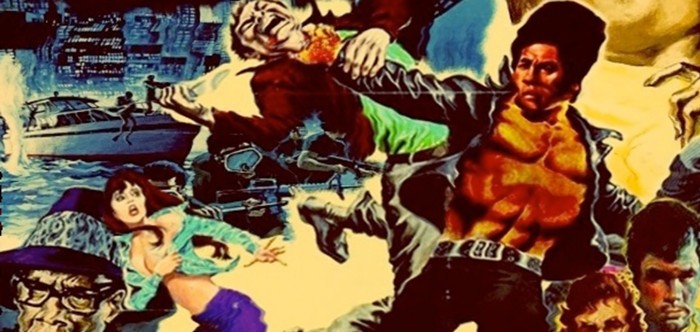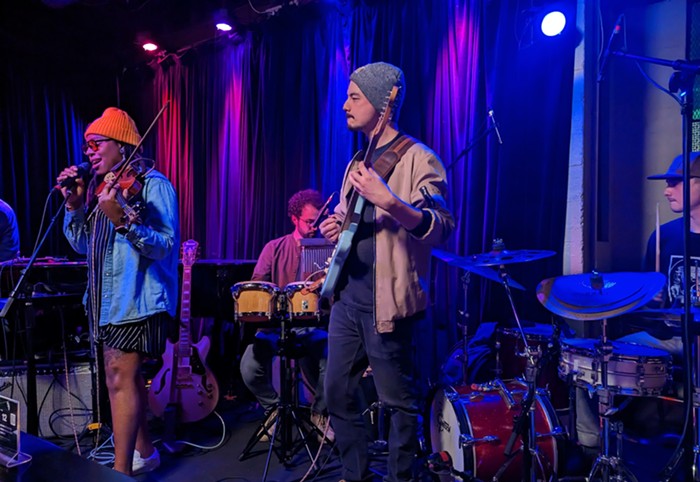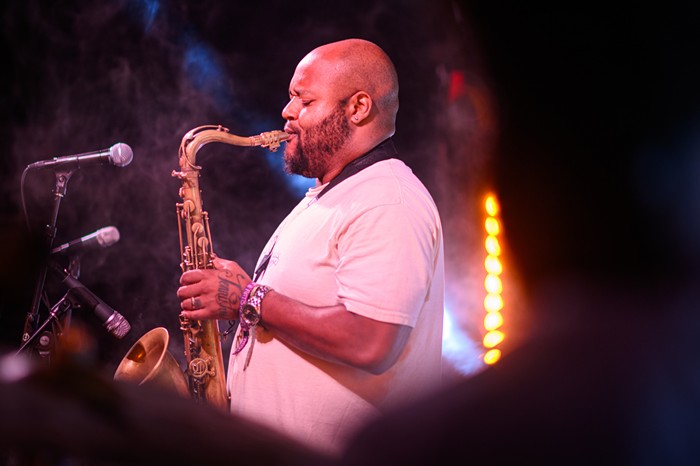Though you might not know their names (yet), several producers, DJs, and beatmakers create the sounds that power Portland’s flourishing hip-hop scene. An upcoming Red Bull showcase on Friday at the Evergreen aims to shine a spotlight on local artists who deserve to be recognized and celebrated.
In addition to Neill Von Tally—perhaps the most well-known creative on the bill—the lineup packs four dope DJs/producers who are shaping Portland hip-hop’s sound from behind the scenes: Sxlxmxn (pronounced Solomon), Fritzwa, Trox, and 17-year-old Quickly Quickly.
“I think producers really do not get their just due,” Fritzwa says via Skype. “They play such a large role and are completely forgotten—sometimes they don’t get credited, sometimes credit gets taken, sometimes they don’t get paid.”
In a recent interview, Trox and Sxlxmxn discuss the fact that during the early years of hip-hop, DJs were the stars of the show—an MC often needed the DJ’s permission to get on the mic in the first place. Following the massive success of the Sugarhill Gang’s “Rapper’s Delight,” popular culture began to rally around innovative MCs like Kurtis Blow and Melle Mel (of Grandmaster Flash’s Furious Five crew).
“Even in the ’80s, when the MC became the forefront of everything, that was because people weren’t buying albums from DJs, they were buying albums from MCs and artists like LL Cool J,” says Trox. “They wouldn’t buy an album by just Grandmaster Flash. They would buy an album from Grandmaster Flash and the Furious Five.”
Decades later, MCs still maintain control of the spotlight. Events like the recurring Thirsty City focus on the producers who make the beats, but they’re still a rarity, especially in Portland.
“You see it in bigger cities, but not in a city like Portland,” Trox continues. “I actually feel like it’s kind of an anomaly here.”
“No, it doesn’t happen,” Sxlxmxn chimes in. “And places it should happen, it doesn’t. Things like the Do-Over [an annual touring showcase] and stuff—it should be our DJs/producers, you know? And year-round, too. But it’s always some corporate-ass DJ. The closest I think that we got was Nature, and that was years ago.”
Throughout our conversation, it’s clear that Trox and Sxlxmxn are super tight—they finish each other’s sentences and repeatedly mention how they first met at a showcase called the Neck Brace and have stayed friends for a decade. It’s a Portland hip-hop bromance if I’ve ever seen one.
“The Neck Brace was a producer showcase,” Trox explains. “Our boy Dave Notti put it together. He’d bring four producers out, they’d bring their equipment with them, and then they’d just bang out. In front of a live audience—it was cool. That’s how we met.”

Sxlxmxn, Trox, and Fritzwa (and probably most other young producers) have a few key things in common: They all got their start after playing around on the FruityLoops program (now called FL Studio), learning instruments like piano and drums, and building relationships through the producer community.
Sxlxmxn’s gone through two name changes (Stewie Vuitton and Stewart Villain) and says his sound has changed a lot over the years, evolving from what he calls a “weird trap phase.” with artists like Three 6 Mafia, Waka Flocka, and 50 Cent serving as his inspiration Today he lists Kaytranada, Kanye West, Minnie Riperton, and Jermaine Dupri’s Instructions as some of his greatest musical influences. Sxlxmxn loves playing with BPMs (beats per minute), and has worked with the likes of Danny Brown, the Underachievers, Smoke DZA, and Dave B (he did a substantial amount of work on the Seattle rapper’s 2015 debut, Punch Drunk).
Though Fritzwa’s known locally for her solo work as an R&B/hip-hop artist (check out her super-solid album Avenue A) and for performing with a live band, she started her DJing career by hosting house parties.
“I always bring the party to me,” she says. “I’d have all these house parties and I’d be sitting at the computer or with my iPod and just curating during the party. That was my thing. I think to the point where a few of my friends were like, ‘This is ridiculous. You should probably get some DJ equipment.’”
Fritzwa is an excellent fucking DJ, and always knows exactly what to play to get booties a-shakin’.
“For me, DJing is not about me at all,” she says. “I have to do whatever I have to do to make sure that whoever the group is that’s on the dance floor—if that’s 75-year-old white people, then I know what to play. If it’s a diverse group of millennials, then I know what to play. And I think I know to play not only what’s current, but from 20 or 30 years back. I think over time I’ve been able to, through osmosis, feel what makes people move.”
Fritzwa is slightly newer to the Portland scene, having moved here from New York a couple of years ago to take a job with Nike. She says that before arriving in town, she didn’t have much experience performing in front of people. She credits musicians like keyboardist Charlie Brown, guitarist Trent Barstool, and the late StarChile for showing her the ropes in Portland. Fritzwa’s been in LA for the past month working on her forthcoming album. “One of my short-term goals is to have a lot of songs that resonate in a big way that my voice isn’t on,” she says. “That’s one of the biggest reasons I’m out here in LA doing a lot of sessions with artists and people from a songwriting/production perspective, because It’s important for me to display that I’m not just a face or a look or a voice, but that there’s some real craftsmanship that goes into the sounds.”
When asked why we don’t see as many women producing, Fritzwa says she got into the field because she’s a control freak.
“I like working with producers, but most of the time, if someone sends me a song, there’s something about it I don’t like. There’s something I would change, there’s a sound that would be different. So that’s part of my impulse or what drives my inclination to want to produce. But I don’t know... maybe it’s not that there aren’t many, I think maybe they’re just not getting the opportunities or they’re not getting credited,” she explains. “I mean, there’s a couple—there’s WondaGurl, she’s actually the only person that’s doing it on that level and making millions of dollars in cuts. Yeah, there’s very few. Like Missy Elliott and her.”

“I think there’s a lot,” Sxlxmxn says. “They just don’t get nearly as much time as they should.”
“It’s a very male-dominated industry, and it’s a reality that we all have to face,” Trox agrees. “We have to figure out what’s going on, what do we do about this, how can we solve this? How can we give these female producers more shine?”
Inspired by works from Dr. Dre and DJ Battlecat, as well as Prince and Curtis Mayfield, Trox brings his bass-heavy beats to tracks by Portland artists (like Fritzwa’s “Bouncin’”) and is the resident DJ at the monthly Mic Check showcase, but has also got some big names on his résumé.
“My work with 50 Cent—that changed my life,” he says. “Me and [Ty Farris] have the most chemistry of anyone. We roast each other in the studio, we joke around, we still get things done. He’s from Detroit and he’s actually going to come out here and be one of my surprise guests for the show.”
When asked why the culture has pushed the DJ to the background to make room for the front-facing MC, all three say it’s time to take back some of the power.
“Rappers kind of became a little bit corny,” Sxlxmxn says. “Not all the time does someone want to see a rapper up there.”
Fritzwa nods to DJ/producers like Khaled, Scott Storch, and DJ Envy for making albums that are fair to the sound crafters.
“The music industry is not fair and never has been, at least in this country,” she says. “It’s like, ‘All right, the artist doesn’t wanna give me my credit or my money, so I’m just gonna put together an album. I’ll use the artists, I’ll make all the stuff. You’re the feature on my project so everybody knows that I did it.’ It’s about deciding that you’re worth more than that and rising to the top.”


















